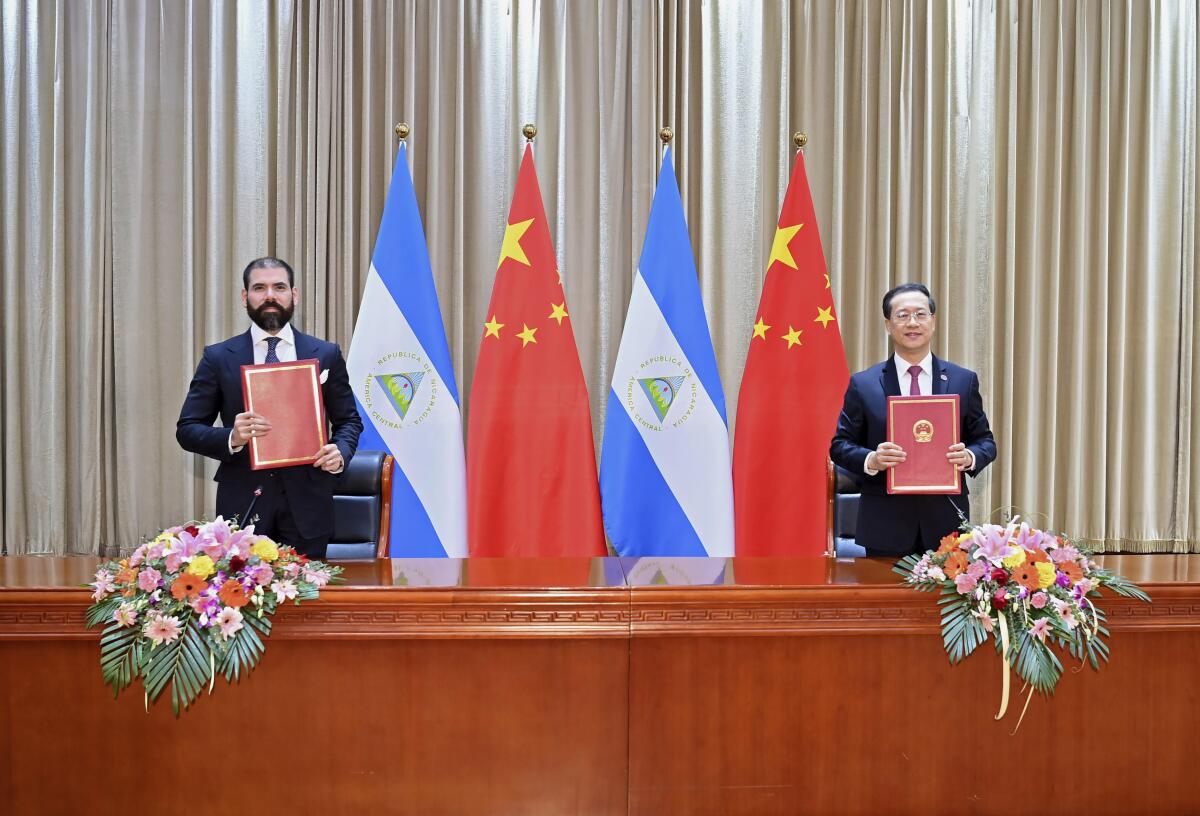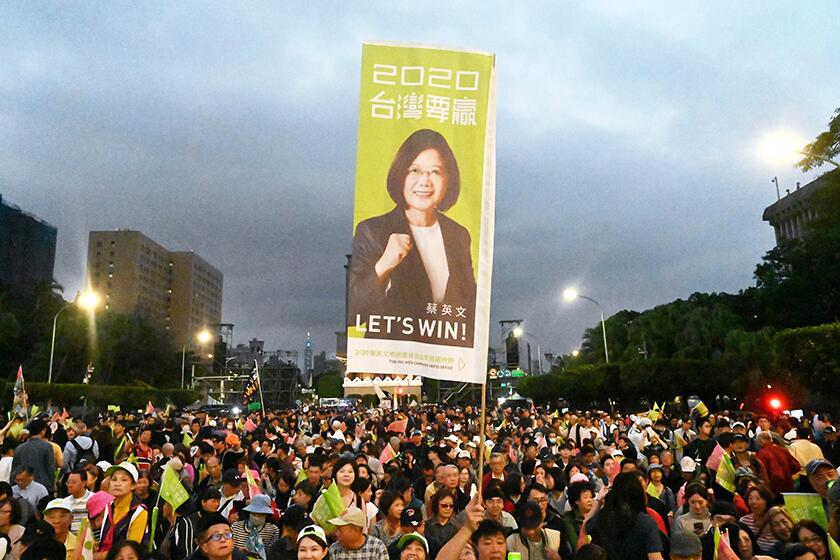Taiwan loses one of its last diplomatic allies as Nicaragua recognizes China

TAIPEI, Taiwan — Taiwan lost Nicaragua as a diplomatic ally after the Central American country said it would officially recognize mainland China instead, which claims self-ruled Taiwan as part of its territory.
“There is only one China,” the Nicaraguan government said in a statement Thursday. “The People’s Republic of China is the only legitimate government that represents all China, and Taiwan is an inalienable part of the Chinese territory. ... As of today, Nicaragua breaks its diplomatic relations with Taiwan and ceases to have any official contact or relationship.”
The move increases Taiwan’s diplomatic isolation on the international stage, even as the self-governed island steps up official exchanges with countries such as Lithuania and Slovakia, which do not formally recognize Taiwan as a country. Taiwan now has only 14 diplomatic allies remaining.
“What is most important to Taiwan is the number of countries with which it maintains diplomatic relations,” Jason Marczak, director of the Atlantic Council’s Adrienne Arsht Latin America Center, said in an email. “In Central America, Nicaragua is now the third country that has switched recognition from Taiwan to China in the last four years. I wouldn’t be surprised if more are to come.”
Taiwan’s Ministry of Foreign Affairs expressed “sadness and regret” and said it would immediately recall its diplomatic staff.
President Biden’s invitation for Taiwan to participate in his democracy summit draws the island deeper into the struggle between China and the U.S.
“The more successful Taiwan’s democracy and the greater the international support, then the greater the pressure from the authoritarian camp,” Taiwanese President Tsai Ing-wen said Friday in response. “Whether it’s diplomatic pressure or military intimidation, we will not change our determination to adhere to democracy and freedom, to go on the international stage and participate.”
China has been poaching Taiwan’s diplomatic allies over the last few years, cutting down the number of countries that recognize the democratic island as a sovereign nation. China is against Taiwan representing itself in global forums or in diplomacy. The Solomon Islands chose to recognize China in 2019, cutting diplomatic ties with Taiwan.
The Nicaraguan government signed an official communique Friday in the Chinese city of Tianjin to reestablish diplomatic ties with Beijing, according to Chinese state broadcaster CCTV. Under the agreement, Nicaragua promises not to have any official contact with Taiwan.
“The resumption of diplomatic ties between China and Nicaragua is a policy decision, and definitely not a trading of bargaining chips,” China’s Ministry of Foreign Affairs spokesperson Wang Wenbin said at a briefing Friday. He denied that there were any “economic preconditions” to establishing ties.
To deter armed conflict over Taiwan, the U.S. must make policy changes to deal with an assertive China while counseling Taiwan to act with caution.
Some experts say the switch is not necessarily a significant loss for Taiwan and may have been inevitable. Taiwan has been increasing its exchanges with Western countries and has emphasized the sharing of democratic values and working with “like-minded” nations.
“Everyone could see early on that this diplomatic relationship couldn’t be kept,” said Antonio C. Hsiang, a professor at the National Academy of Political and Strategic Studies in Chile and an expert on Taiwan’s relations in Latin America.
Taiwan’s emphasis on democratic values stands in contrast to many of its diplomatic allies, such as Honduras and Nicaragua, where President Daniel Ortega was reelected in November in what the United States called a “pantomime election.”
The U.S. State Department weighed in on the diplomatic switch Friday, saying in a statement that “Ortega’s actions cannot reflect the will of the Nicaraguan people, who continue to struggle for democracy and the ability to exercise their human rights and fundamental freedoms.”
Start your day right
Sign up for Essential California for the L.A. Times biggest news, features and recommendations in your inbox six days a week.
You may occasionally receive promotional content from the Los Angeles Times.
Hsiang said he viewed the diplomatic break as a response to the growing Taiwan-Lithuania relationship, as well as Taiwan’s invitation to President Biden’s Summit for Democracy, which is being held this week.
Chinese officials viewed it as a victory on a larger playing field. “We won yet another beautiful battle,” another Chinese Foreign Ministry spokesperson, Zhao Lijian, wrote on his personal Weibo account, while sharing a video of Nicaraguan Foreign Minister Denis Moncada Colindres reading the statement saying that Taiwan is an “inalienable” part of China. Zhao called the change part of “an irresistible trend.”
Nicaragua established diplomatic relations with Taiwan in the 1990s, when President Violeta Chamorro assumed power after defeating Ortega’s Sandinista government at the polls. Ortega, who returned to power in 2007, had maintained close ties with Taipei until now.
More to Read
Sign up for Essential California
The most important California stories and recommendations in your inbox every morning.
You may occasionally receive promotional content from the Los Angeles Times.










